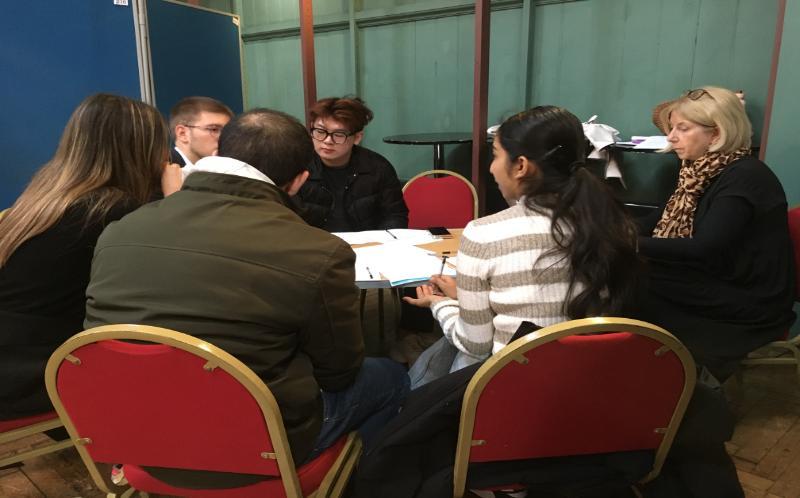Embedding Employability in the UG Business Management Curriculum: Equipping UG Students with Career Management Skills through a Compulsory Professional Development module.

In collaboration with
The compulsory Business Management Year 2 module Professional Development 2 builds on the employability skills introduced in Year 1. Students reflect on their developing QMUL graduate attributes, mapping them to personal experiences to uncover hidden skills and potential gaps. They are supported to explore internal employability provision, establish professional connections on LinkedIn, and research and apply for internships, placements and jobs.
Responding to a need
The module was developed:
- To enhance students’ career management and employability skills.
- To enrich their overall experience at Queen Mary.
- To boost their confidence in securing work experience.
- To improve Graduate Outcomes.
Approach used
SBM’s Professional Development - 2 module aligns with the 2030 Strategy for Academic Excellence in Curriculum. The module is designed to provide experiential learning opportunities to a diverse cohort of Year 2 BSc Business Management students in SBM, fostering confidence in applying for internships, placements and graduate-level roles.
The module is compulsory and timetabled to ensure equitable access for all students, including those who may not participate in ‘optional’ extra-curricular activities. This approach ensures that every student has the opportunity to enhance their career management and employability skills.
The module offers experiential activities and authentic assessment. It also provides exposure to employability programmes, career planning, employers, and the graduate recruitment process. A notable highlight includes a session co-taught by a graduate recruiter during the ‘Think Like a Recruiter’ session.
Student learning outcomes are shaped by their experiences, with time allocated each week to gather student input on the topics they wish to explore further.
The module employs learning and assessment approaches that provide direct experience of contemporary graduate recruitment practices. These include self-reflective exercises, LinkedIn optimisation, CV surgeries, interview preparation, networking, and psychometric testing, culminating in an employer-led Assessment Centre. Students are also encouraged to reflect on the graduate attributes they are developing through their degree programme and to articulate these effectively to employers, both in writing and in person.
In addition, students are introduced to the use of AI tools to develop critical thinking and career management skills. Through hands-on experimentation, they learn how to critically analyse and leverage AI for applications, cover letters and interviews, gaining valuable insights through trial and error.
At the end of the module, students take part in a ‘real life’ Assessment Centre and are assessed by experienced graduate recruiters. During the Assessment Centre, students undergo three exercises: a group work, group presentation, and an individual interview. After their assessments, students get a personalised feedback report on their performance and areas for improvement on each of the four competencies:
- Commercial awareness
The ability to demonstrate an understanding of the business world and the factors that affect it. - Communication
The ability to clearly articulate thoughts and ideas and listen to the views of other people. - Project Management
The ability to apply knowledge and skills to initiate, organise and take ownership of activities to meet project requirements. - Working together
The ability to share information and build supportive, trusting, and professional relationships with others.
“I learnt the most from the individual interview as I sometimes find it nerve-racking but we learnt how to compose ourselves and how body language is just as important as the responses given”.— QMUL Student
Impact
In the 2023/24 academic year, 300 students participated in the module. The short-term impact of the Assessment Centre is evident: In 2023/24, 88% of students felt ‘confident’ or ‘very confident’ post-assessment applying for jobs, compared to 48% pre-assessment (an uplift of 40%).
Module evaluations were:
- 86% of students were satisfied with the module.
- 81% felt the module materials were clear.
- 79% felt the topics were relevant to the module.
- 80% felt the module activities helped to understand the module materials.
- 80% felt comfortable voicing their opinions in class.
- 77% of students rated themselves as confident or very confident after the Assessment Centre event, compared to 39% before the event (an uplift of 38%)
- 97% of students would recommend the Assessment Centre experience.
Recommendations
Based on student feedback and staff reflections, the following recommendations are proposed:
1. Embed career management and employability skills into the curriculum:
Embedding career management skills in the curriculum equips students with the practical tools and knowledge needed to navigate the job market successfully.
By embedding career management skills directly into the curriculum, institutions can provide equitable access to employability resources for all students, including those who may not have the time or confidence to engage with extracurricular activities.
This inclusive approach ensures that students from underrepresented groups or diverse socio-economic backgrounds are equally supported in developing the skills and confidence needed to achieve their career aspirations.
2. Divide students into smaller groups:
Dividing students into smaller groups would facilitate more interaction, better engagement, and personalised feedback, making it easier for students to focus and participate actively.
Smaller groups would also allow for more in-depth exploration of topics, ensuring students have ample time to grasp and apply critical skills effectively.
3. Use smaller classrooms instead of lecture theatres:
Conducting sessions in appropriately sized classrooms rather than lecture theatres would foster a more interactive and comfortable learning environment, improving student attention and participation.
4. Invite industry professionals and alumni:
Industry professionals and alumni provide students with valuable, first-hand insights into current trends, expectations, and challenges within the job market.
Such interactions offer students the chance to build networks, seek mentorship, and gain direct exposure to potential career paths and industries.
Alumni, in particular, serve as relatable role models who can inspire and motivate students by sharing their journey from university to successful careers, and help students visualise their own potential career trajectories.
5. Incorporate experiential activities and authentic assessments:
Include practical tasks and assessments such as completing real job applications, mock assessment centres, and tailored exercises aligned with students' specific career aspirations to enhance relevance and readiness.
6. Offer personalised tutorials:
Introduce tutorial sessions to provide individualised support, addressing students’ specific needs, questions, and challenges in applying for roles or developing their skills.
“I think I have learned how to successfully apply for jobs, which is an invaluable knowledge we all need at this point”.— QMUL Student
